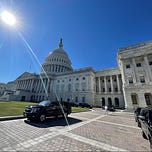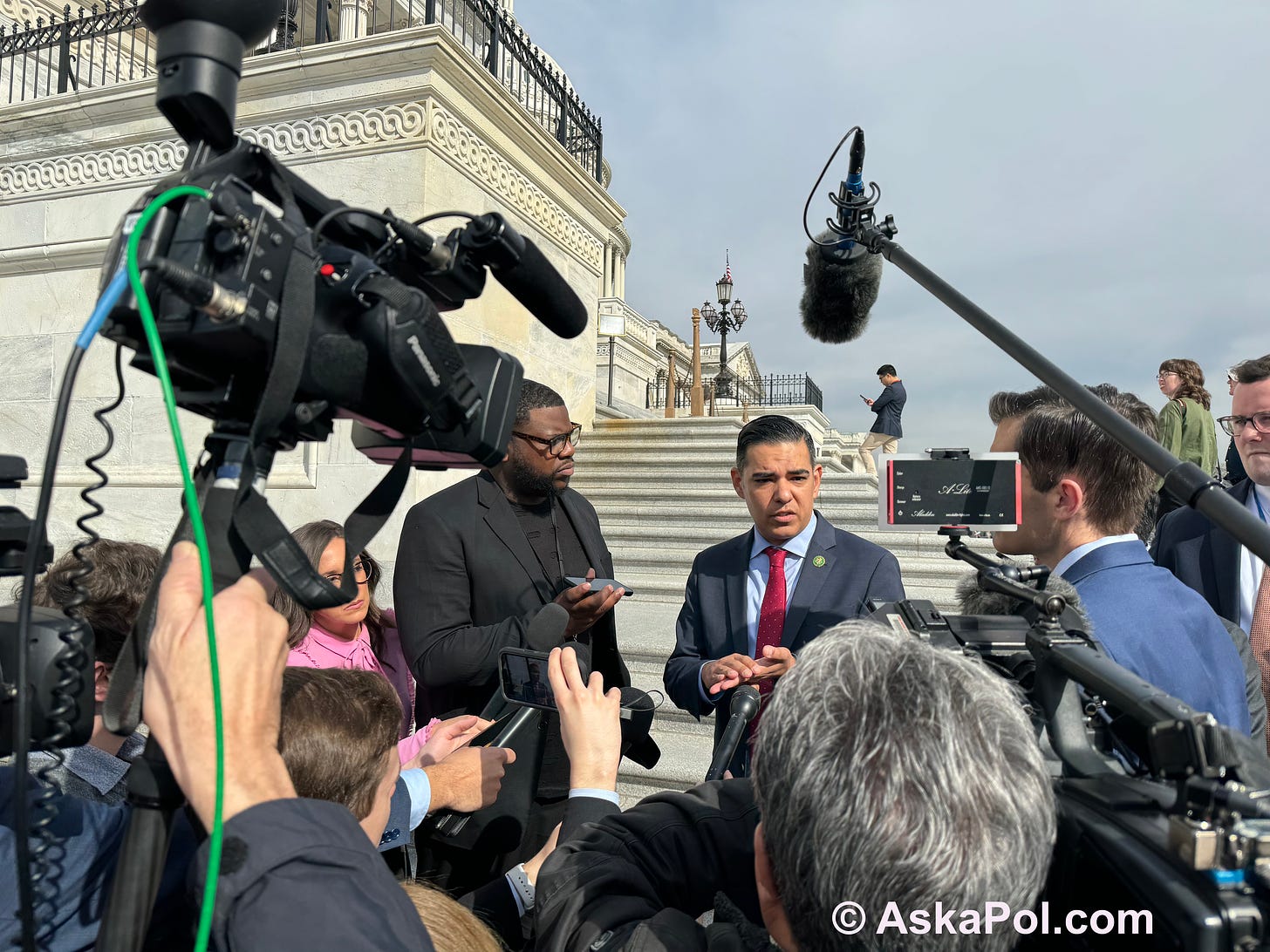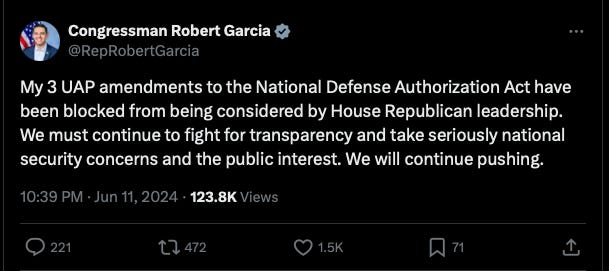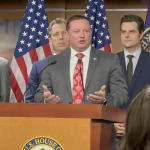Our sincerest apologies. Prof. Laslo delivered a sweeping generative AI lecture at NPR HQ last Friday — “Make Politics Boring (Again): Outfoxing AI, deepfakes & the nationalization of local politics” — and to prepare he whipped through some 30 books and a few thousand pages of research in May. This interview fell through the cracks.
Who?
Rep. Robert Garcia (D-CA)
LISTEN: Laslo & Garcia
HAPPY BIRTHDAY…to us!
Ask a Pol turns 1-year-old this month. 387 posts, yet still 365 days in a year. If you support us, support us and SUBSCRIBE!
Ask a Pol asks:
Some members of the UAP Caucus are a little skeptical. They're like, ‘Wait, is he playing politics? He didn’t talk to us first….’ Are they right? Or is that just political hurt feelings?
“I mean, right now it's on the majority to schedule more public hearings, and so we've come up with UAP amendments,” Rep. Robert Garcia exclusively told Ask a Pol. “I think, the issue is bipartisan. And I think that we'll continue to file amendments and we have on a variety of topics.”
Promise to pull “every single lever” of power
“Broadly speaking, I think that we have a responsibility to use every single lever that we have in Congress to get information, and these amendments are a part of that process,” Garcia told us.
ICYMI — Rounds tells us Senate looking at “tweaks” to UAPDA in NDAA
Have you reached out to Schumer and Rounds?
“I have to check,” Garcia said. “I think my [legislative] team have been in communication with Senate leg. folks as well. I have to get back to you to know exactly who, but it's been happening for months.”
Some people are dubious of the board in the UAPDA?
“I don't find it to be dubious,” Garcia said. “I think that within this UAP space, there's a lot of noise and there's a lot of folks, but I think what's needed is responsible legislating. And I think you need to have responsible legislation and responsible people doing that work…that's my personal commitment is that I'm very interested in the topic — I have been long before I got the Congress — and I'm gonna continue to be very active in this space.”
“There is movement and there is progress being made”
“I would argue that the responsiveness to Congress in the last year has been dramatically different than in the past. And, so yeah, I think that there is movement and there is progress being made,” Garcia told Ask a Pol. “There's no doubt that whether it's DOD [Department of Defense] or our friends at NASA or other folks, are very aware that there's a lot of interest.”
SUMMER INTERN FUND!
Consider chipping in to support our independent journalism — Venmo, PayPal, Cash App — or just buy us a beer!
Caught our ear:
“I have learned an immense amount in the hearings and classified briefings. So I feel like the issue is moving forward, and I don't think we should prejudge what, you know, what we think the outcome should be,” Garcia told us. “I'm a professional. I'm an educator. I do a lot of my own research. I'm not into the conspiracy — I'm not a conspiracy theorist. I want to follow the facts, and so that's kind of why I'm doing this.”
For the curious: Laslo’s AI lecture
Matt Laslo’s a veteran congressional correspondent, new media prof. & founder of Ask a Pol — a new, people-powered press corps.
Content posted at AskaPol.com is copyrighted. Use our original content to move the story forward. And, please, link to us.
SUBSCRIBER-ONLY CONTENT*
*Student? Lost a gig? Hard times? Been there. Others had us; we got you. No questions asked. Ping us for full access to all content, if you need.
TRANSCRIPT: Rep. Robert Garcia
SCENE: In between voting on the floor of House of Representatives, Ask a Pol grabs Rep. Garcia for a quick interview. After a few minutes, a couple other reporters then see us and come over to ask Garcia about President Joe Biden’s new migration policy.
Matt Laslo: “Why introduce the UAPDA?”
Rep. Robert Garcia: “I think because we have to try every single avenue possible to try to actually get some of these bills done. And I think it keeps steady pressure on the majority to kind of get it out. And it's a big issue. There's a lot of community and public support. And we have filed a lot of amendments, not just on this topic, but we did last year and we'll continue to do it on UAPs as well.”
ML: “Some members of the UAP Caucus are a little skeptical and they're like, ‘Wait, is he playing politics? He didn’t talk to us first….’ Is that just political hurt feelings?”
RG: “I mean, right now it's on the majority to schedule more public hearings, and so we've come up with UAP amendments. I think, the issue is bipartisan. And I think that we'll continue to file amendments. And we have on a variety of topics.”
ML: “Yeah? And like, have you reached out to Schumer and Rounds? Because Rounds told me that they're starting to have talks and that they're considering tweaks.”
RG: “I have to check. I mean, I think my [legislative] team have been in communication with Senate leg. folks as well. I have to get back to you to know exactly who, but it's been happening for months.”
ML: “Because it was interesting here that it didn't even come up in the Armed Services markup, that the issue didn't even come up.”
RG: “Yeah.”
ML: “Which is that kind of what woke you up and made you introduce it?”
RG: “Yeah, but I think we — you know, it's not just on this issue. But cannabis legislation, UAP legislation. I mean, there's some issues, I think, that need to be constantly brought up publicly, because it brings attention when you want, you know, one of these sessions and one of these opportunities will actually come through. So the amendments are pretty standard, you know.”
ML: “Some people are dubious of the board in the UAPDA?”
RG: “I don't find that to be dubious. So I think that is within this UAP space, there's a lot of noise and there's a lot of folks. I think what's needed is responsible legislating, and I think you need to have responsible legislation and responsible people doing that work. And I think that's, you know, that's my personal commitment is that I'm very interested in the topic — I have been long before I got the Congress — and I'm gonna continue to be very active in this space.”
ML: “Because they haven't been responsive to Congress, is this kind of a wake up call to the executive branch, like hey, ‘wake up.’”
RG: “I would argue that the responsiveness to Congress in the last year has been dramatically different than in the past. And, so yeah, I think that there is movement and there is progress being made. There's no doubt that whether it's DOD [Department of Defense] or our friends at NASA or other folks, are very aware that there's a lot of interest. And I have learned an immense amount in the hearings and classified briefings. So I feel like the issue is moving forward, and I don't think we should prejudge what, you know, what we think the outcome should be. And I'm not, you know, I'm not — like, I'm a professional. I'm an educator. I do a lot of my own research. I'm not into the conspiracy — I'm not a conspiracy theorist. I want to follow the facts, and so that's kind of why I'm doing this.”
ML: “What are your thought on eminent domain, because I know there's been some conversations about that provision of NDAA.”
RG: “I mean, I don’t know that I have immediate comments on that right now.”
ML: “Yeah?”
RG: “Let me just say that, broadly speaking, I think that we have a responsibility to use every single lever that we have in Congress to get information, and these amendments are a part of that process.”
Reporter: “Hey Congressman, how are you….”


















Share this post